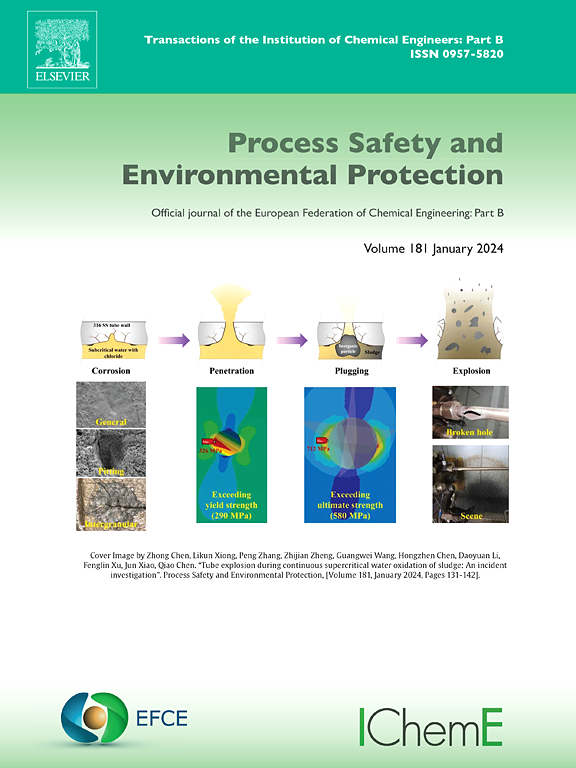Research on dynamic well control in riserless mud recovery system
IF 6.9
2区 环境科学与生态学
Q1 ENGINEERING, CHEMICAL
引用次数: 0
Abstract
In order to promote the development of RMR (Riserless Mud Recovery) system well control technology and ensure the safe operation of deep water drilling operations, the overflow control equation of RMR system considering the lifting force of subsea pump is established and verified, the conventional overflow monitoring method and the overflow monitoring method based on subsea pump parameter variation are compared and analyzed. the dynamic well control process of the RMR system after overflow under the two modes of constant subsea pump displacement and constant inlet pressure of subsea pump is simulated, and the influencing factors of inlet pressure of subsea pump are further analyzed. The results show that although the temperature effect is taken into account in the model established in this paper, the time error of the mud pool increment, the inlet pressure and the displacement of subsea pump after reaching the overflow criterion is less than 22.5 % compared with Froyen's model. The conventional overflow monitoring method has fast response and small change, while the overflow monitoring method based on subsea pump parameter change is on the contrary, and the two should be used together. Both the constant inlet pressure of subsea pump mode and the constant subsea pump displacement mode can control overflow, but from the stability of subsea pump, service life and well control safety, the constant displacement mode is better. In the case of large formation pressure, low drilling fluid density, overflow criteria and circulating displacement, the pressure response adjustment speed of the subsea pump inlet is faster, and the back pressure load of the subsea pump inlet can be effectively alleviated by appropriately increasing the circulating displacement and drilling fluid density. This study has enriched the theoretical system of RMR system in overflow control, and has certain guiding significance for the development of deepwater and ultra-deepwater drilling safety technology.无隔水管泥浆回收系统中的动态井控研究
为促进RMR(Riserless Mud Recovery)系统井控技术的发展,保障深水钻井作业的安全运行,建立并验证了考虑海下泵举升力的RMR系统溢流控制方程,对比分析了常规溢流监测方法和基于海下泵参数变化的溢流监测方法。模拟了在海下泵排量恒定和海下泵入口压力恒定两种模式下,RMR 系统溢流后的动态井控过程,并进一步分析了海下泵入口压力的影响因素。结果表明,虽然本文建立的模型考虑了温度效应,但与 Froyen 的模型相比,达到溢流标准后的泥浆池增量、海底泵入口压力和排量的时间误差均小于 22.5%。传统的溢流监测方法响应快、变化小,而基于海底泵参数变化的溢流监测方法则相反,两者应结合使用。海下泵入口压力恒定模式和海下泵排量恒定模式都可以控制溢流,但从海下泵的稳定性、使用寿命和井控安全性等方面考虑,排量恒定模式更好。在地层压力大、钻井液密度小、溢流标准和循环排量大的情况下,海下泵入口的压力响应调整速度较快,通过适当增加循环排量和钻井液密度可以有效缓解海下泵入口的背压负荷。该研究丰富了溢流控制中RMR系统的理论体系,对深水和超深水钻井安全技术的发展具有一定的指导意义。
本文章由计算机程序翻译,如有差异,请以英文原文为准。
求助全文
约1分钟内获得全文
求助全文
来源期刊

Process Safety and Environmental Protection
环境科学-工程:化工
CiteScore
11.40
自引率
15.40%
发文量
929
审稿时长
8.0 months
期刊介绍:
The Process Safety and Environmental Protection (PSEP) journal is a leading international publication that focuses on the publication of high-quality, original research papers in the field of engineering, specifically those related to the safety of industrial processes and environmental protection. The journal encourages submissions that present new developments in safety and environmental aspects, particularly those that show how research findings can be applied in process engineering design and practice.
PSEP is particularly interested in research that brings fresh perspectives to established engineering principles, identifies unsolved problems, or suggests directions for future research. The journal also values contributions that push the boundaries of traditional engineering and welcomes multidisciplinary papers.
PSEP's articles are abstracted and indexed by a range of databases and services, which helps to ensure that the journal's research is accessible and recognized in the academic and professional communities. These databases include ANTE, Chemical Abstracts, Chemical Hazards in Industry, Current Contents, Elsevier Engineering Information database, Pascal Francis, Web of Science, Scopus, Engineering Information Database EnCompass LIT (Elsevier), and INSPEC. This wide coverage facilitates the dissemination of the journal's content to a global audience interested in process safety and environmental engineering.
 求助内容:
求助内容: 应助结果提醒方式:
应助结果提醒方式:


